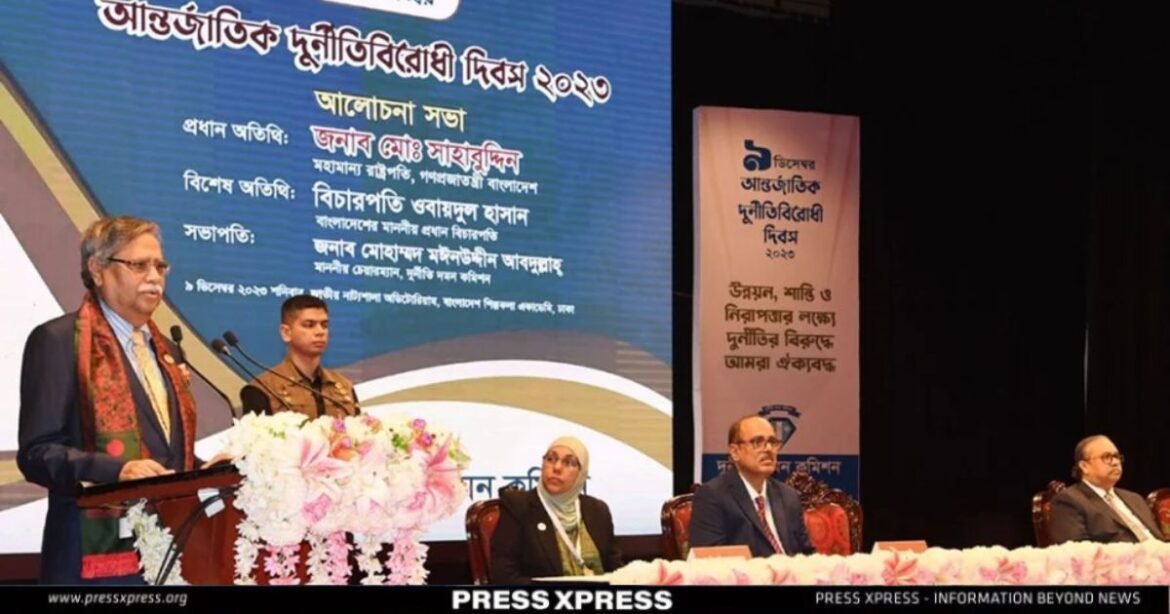With building ‘Sonar Bangla’ envisioned by Father of the Nation Bangabandhu Sheikh Mujibur Rahman, the ACC will play a leading role in the implementation of the Vision-2041, Delta Plan-2100 and building a corruption-free Bangladesh, says President Mohammed Shahabuddin
President Mohammed Shahabuddin urged Anti-Corruption Commission (ACC) officials to uphold the highest standards of morality and integrity in carrying out their duties.
Addressing a gathering at the Bangladesh Shilpakala Academy on International Anti-Corruption Day 2023, President Shahabuddin emphasized the crucial need for ACC officials and employees to demonstrate utmost morality and professionalism in their assignments. He stressed the importance of impartiality in their duties to instill public trust and confidence in the Anti-Corruption Commission.
Highlighting the significance of the day, president Shahabuddin also called for the transformation of the ACC into a modern, professional, and effective institution. He urged officials of the state-owned anti-graft watchdog to exercise caution in their work to prevent innocent individuals from falling victim to any wrongdoing.
The president said, “If we want to fight corruption, we have to start from the family as family, social education, and religious sentiments can also play a very conducive role in preventing corruption.”
Ensuring Government Accountability
A governmental institution designed for ensuring government accountability, the ACC’s effectiveness correlates directly with the intentions of the ruling administration. The extent to which the ACC fulfills its mandate significantly hinges on the leadership’s capacity to leverage legal and institutional resources.
However, historical records show that no government has granted the ACC complete autonomy, nor has the ACC operated at its peak potential to garner public trust. The crux lies in the mutual perception between successive governments and the ACC itself. Both have often regarded the ACC as an integral part of the executive, overlooking the fundamental role—holding the government accountable—despite its origination under governmental authority.
Zero Tolerance Pledge
The prime minister’s proclamation of a zero-tolerance policy towards corruption stands as the cornerstone of the Awami League’s (AL) election manifesto. This party secured an unprecedented and resounding victory in the election conducted on December 30, 2018. The manifesto notably underscores the significance of an efficient Anti-Corruption Commission (ACC).
“The corrupt people have no party and no principle.”
Referring to the ‘zero tolerance’ policy against corruption of the government led by Prime Minister Sheikh Hasina, President Mohammed Shahabuddin said.
When the ACC was set up in November 2004, the Anti-Corruption Commission (ACC) sparked high hopes. Yet, disillusionment swiftly followed. It became widely recognized that the government at that time lacked the dedication to allow the Commission to operate with autonomy and efficacy. It was common information that commissioners were selected based on biased political motives.
In 2022, Bangladesh encountered limited instances of terrorist violence as authorities persisted in their rigorous pursuit of militants, particularly al-Qa’ida-affiliated groups, Jamaat-ul-Mujahideen (JMB), and an ISIS-affiliated JMB offshoot Neo-JMB.
Prime Minister Sheikh Hasina and other Bangladeshi government officials often emphasised Bangladesh’s zero-tolerance policy on terrorism and continued to reject the presence of globally organised jihadist militant groups such as al-Qa’ida and ISIS.
Public Trust and Accountability
President Shahabuddin urged ACC officials and employees to execute their responsibilities impartially and professionally, highlighting the importance of establishing the ACC as a trusted entity in the eyes of the public. Emphasizing the need for a modern, proficient, and efficient institution, he stressed the importance of ensuring that innocent individuals do not fall victim to wrongful accusations.
In alignment with the nation’s values stemming from the Liberation War spirit, President Shahabuddin called upon ACC officials to serve the country with patriotism, honesty, and dedication. He reiterated the government’s unwavering commitment to a ‘zero-tolerance’ policy against corruption, asserting that irrespective of political affiliations, corrupt individuals should face legal consequences.
Acknowledging the evolving strategies of corrupt entities in the digital era, the president highlighted the imperative for ACC officials to acquire advanced technological knowledge and skills through comprehensive training. He stressed the optimal utilization of information technology to prevent corrupt practices effectively.
Vision-2041
President Shahabuddin envisioned the ACC as a pivotal player in realizing the aspirations outlined in Vision-2041, Delta Plan-2100, and the mission to build a corruption-free Bangladesh, aligning with the ideals of the nation’s founding father, Bangabandhu Sheikh Mujibur Rahman.
Asserting that the ACC must remain accountable to the people as an independent institution, President Shahabuddin emphasized the necessity for the commission’s employees at all levels to demonstrate the utmost impartiality and morality during anti-corruption endeavors.
Global Perspective on Corruption
Highlighting the global ramifications of corruption, President Shahabuddin underscored its adverse effects on societal disparities, economic growth, and development. He stressed the importance of heightened public awareness in tackling this pervasive issue.
“Corruption extends beyond the borders of Bangladesh . . . It’s a global issue that fosters inequalities in society and obstructs economic growth and progress.”
Recognizing the multifaceted nature of addressing corruption, the president advocated for a comprehensive approach, beginning with instilling ethical values within families, promoting social education, and leveraging religious sentiments to deter corrupt practices. Beside this President Shahabuddin called for an unrelenting fight against corruption to ensure a conducive environment for future generations to thrive in a corruption-free society.
Drawing from his experience as a former ACC Commissioner, President Mohammed Shahabuddin shared insights and memories from his tenure. His address underscored the imperative for unwavering commitment, ethical conduct, and collaborative action in the ongoing battle against corruption, emphasizing the pivotal role of the ACC in establishing justice and integrity within Bangladesh.


